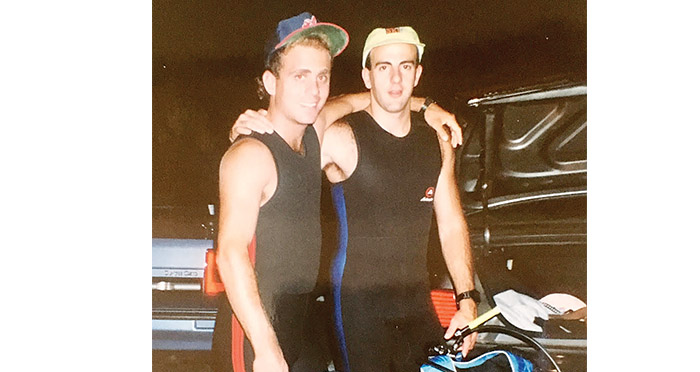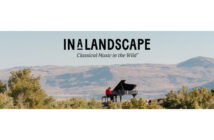Photo courtesy of Rosell Wealth Management: David Rosell and cousin Jon
My survival instinct wasn’t always as strong as it is today. Ever since I watched The Undersea World of Jacques Cousteau TV shows as a child, I’ve wanted to join him in the depths of the sea with a Self Contained Underwater Breathing Apparatus. Yes, that’s where the word S.C.U.B.A. derives from. Diving seemed like the coolest activity under the sun. I was 17 years of age and the concept of hanging out below with the vibrant fish and coral seemed surreal. I decided I would become a certified diver. After a few months of both weekly classroom lessons and practical (in-pool) sessions, I became a proud card-carrying member of PADI, the agency that dominates worldwide scuba certification. I was thrilled. This permitted me to dive anywhere in the world and I wanted to see it all.
With an affinity for jumping in headfirst, I immediately subscribed to Scuba Diving magazine and purchased a pre-owned Scubapro buoyancy compensator and regulator, a Sherwood air tank, along with the obligatory weight belt, mask, fins, snorkel and dive knife.
My cousin Jon, a few years my senior, was an experienced diver. After learning about my recent training he invited me to join him on a dive trip to Catalina Island. As the high speed catamaran entered the harbor in the charming, picturesque town of Avalon, I imagined I was in Dubrovnik, Croatia or Monaco, with the exclusive yachts lining the waterfront. Any remnants of serene energy vacated the premises when Jon informed me that we would be diving that very evening.
“What do you mean diving this evening?” I asked.
“There is nothing better than night diving! The colors are much more vivid than they are during the day when the sunlight gets absorbed. On a night dive, your light source is never more than five or 10 feet away, so the water doesn’t take away any of the light spectrum. This will also offer the promise of unexpected surprises as well as great beauty.”
“That’s great Jon,” I said in a sarcastic tone. “But this is my first time diving in the ocean. I am familiar with chlorine, not salt water. I’m not searching for unexpected surprises yet. I’ve never even used under water lights. This is all new to me!”
I would have been happy to meet in the middle by starting my diving career at dusk when I would have the convenience of gearing up while it was relatively light, but still get the effect of making a night dive. My excitement for diving was quickly turned into terror. Sure I was very comfortable swimming in deep mountain lakes and flowing rivers, but the ocean was a different beast with animal life that could eat you! To say I was anxious before stepping in the dark void of an unlit ocean is a massive understatement.
Night Diving at Catalina Island, 1989
The dive, my first let’s not forget, would have been disconcerting in the best of circumstances. Maneuvering with fins and an air tank out of the water is a cumbersome undertaking out of the water and it felt about as graceful as a hippopotamus on ice skates. I had to catch my breath as the chilly water sent down directly from the Alaskan currents had entered my wet suit as we entered the mysterious waters from the rocky shore beneath the Catalina Casino, the island’s most historical landmark. Jon had shared with me how night diving might be the closest thing to experiencing blindness as everything is pitch dark except for the limited area directly in front of your light.
Peripheral vision is nonexistent. I would soon learn that he was not exaggerating. We quickly reviewed the international diving hand signals so we would be speaking a similar language once under. If there’s one aspect of night diving that is more complicated than day diving, it’s communication. We would need to shine our light directly on our hands so to see what signal the other was using. I clung to my light like a security blanket.
It was time to place our masks over our faces and salty regulators into our mouths. Seaweed engulfed us like a family of octopus. I later learned we were in a kelp forest. I stayed close enough to Jon as it is very easy to become separated from your buddy in this dense environment. I could see nothing. No matter how wide I opened my eyes, I was looking into a void. I scanned my handheld light back and forth, looking for something. Anything. I found it alright! Looking directly into my eyes just inches away was a monstrous, prehistoric, creature equipped with never-ending sharp teeth. This six- foot-long, one-foot-in-diameter green creature looked downright evil.
I had never even heard of a green moray eel, but it is easy to see why they are often feared and mistaken for sea serpents. Their vicious reputation may come from the fact that they continually open and close their mouths to take in water in order to breathe.
I darted for the surface at an alarming rate that should have required emergency transport to a hyperbaric chamber. Rule #1 in scuba is to never dive without a dive buddy. Rule #2 is to never ascend at a faster rate than the bubbles created by your regulator. It took me less than a minute to breach the surface. Bad news. I felt lucky to be alive. I had no idea how lucky I really was. When you come up too fast from a dive, you can experience decompression sickness, commonly called the bends, which is extremely painful and can even be fatal. That’s why divers take courses to receive deep-water dive certification—that training includes a thorough understanding of the risks and safety procedures for descending and ascending to avoid the hazards associated with changes in pressure. But I was in such a state of distress and shock that my lack of experience and innate instincts had taken over.
Looking back we were stupid, stupid, stupid. There are some things you just don’t do on your first ocean dive and diving in a kelp farm at night are two of them. Diving at a site you that you have not experienced during daylight is a third and the list goes on. I should not have been there. I was a diving novice whose knowledge about diving was sketchy at best.
So here’s the question. Are you being stupid when it comes to money?
Sink or Swim
Many intelligent people are inexperienced then it comes to investing and would consider themselves financially illiterate. If you feel like you fall into this category you are certainly not alone. Why is this? Why is personal finance so hard for most people? It may be due to the fact that our schools are not teaching the simple financial basics including personal finance. Can you imagine if you had learned about investing, compound interest and basic financial lessons throughout your schooling? Unfortunately, an economics course just doesn’t do the job of preparing you for your financial future. It is time for our schools to bear some of the responsibilities for teaching these ever-so-important financial lessons.
I also believe we are hardwired to make financial mistakes because most of our financial lessons have come from our parents. But when it comes right down to it, what do most of them know about personal finance? The other major source of financial education comes from the constant barrage of so-called authorities on 24-hour television news. These financial pundits are well aware that fear and pessimism sells, and their primary objective seems to be increasing their Nielsen ratings. I consider many of the shows’ headlines that highlight words like panic and collapse to be financial pornography.
We need to overcome both this lack of education and our reaction to the media’s fear mongering by getting smarter when it comes to money. I want to help ensure you don’t make very poor decisions like I did on Catalina Island. So instead of plunging into a financial abyss that’s even scarier than unknown creatures in an underwater kelp forest, let’s briefly discuss some ideas to increase your financial security and the amount of money you have to save and invest each month.
All too often, financial advice focuses on investing. But you can’t invest if you are spending every dime you make. How much money you keep is far more important than how much money you earn. In other words it’s not what you make, it’s what you keep. Which person do you think will have a brighter financial future? The all-too-common scenario of a person who earns $100,000 a year and spends $110,000 or the person who earns $50,000 and lives on only 90 percent of this income, investing $5,000 for his or her future?
If you don’t want to face the financial equivalent of a bunch of moray eels, here are the very straightforward steps to bring your financial planning to life:
– Spend less than you earn.
– Save what you do not spend.
– Invest what you save.
David Rosell is President of Rosell Wealth Management in Bend. www.RosellWealthManagement.com. He is the author of Failure is Not an Option- Creating Certainty in the Uncertainty of Retirement. Learn more about his book at www.DavidRosell.com or Amazon.com. Ask for David’s book at Barnes & Noble, Newport Market, Cafe Sintra, Bluebird Coffee Shop, Dudley’s Bookshop and Sunriver Resort.
Investment advisory services offered through ValMark Advisers, Inc. an SEC Registered Investment Advisor. Securities offered through ValMark Securities, Inc. Member FINRA, SIPC 130 Springside Drive, Ste 300 Akron, Ohio 44333-2431. (800) 765-5201. Rosell Wealth Management is a separate entity from ValMark Securities, Inc. and ValMark Advisers, Inc.





